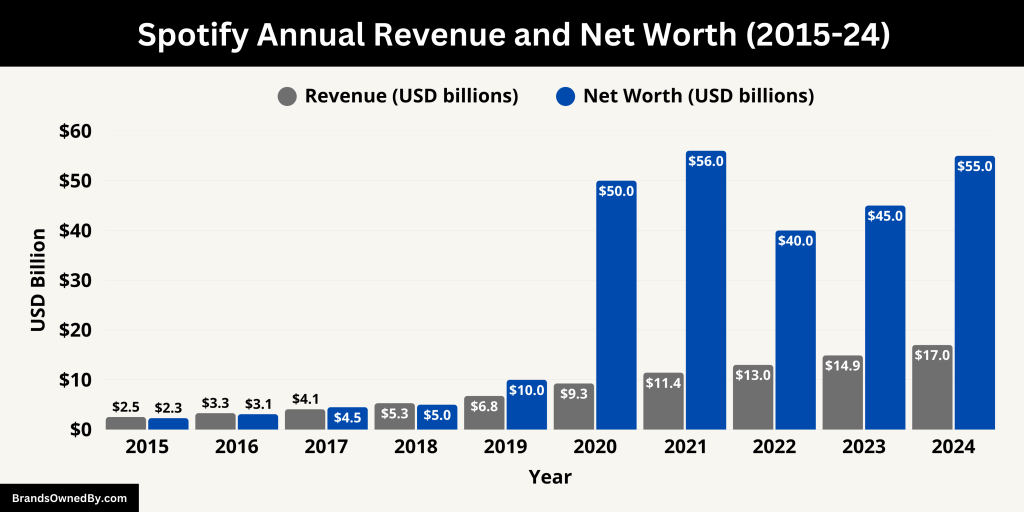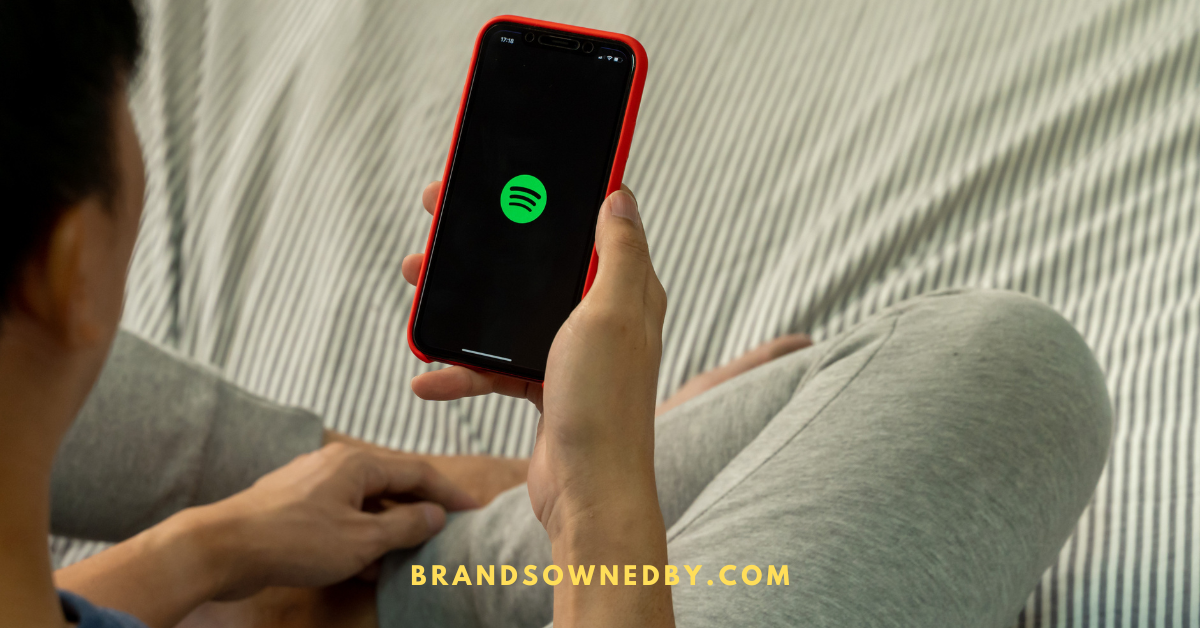Spotify has become synonymous with music streaming, shaping how millions of users around the world discover, listen to, and interact with music.
Over the years, it has expanded its reach not just as a streaming service but as a platform integrating podcasts, personalized playlists, and audio innovations.
Spotify’s growth is also reflected in its strategic acquisitions, strengthening its foothold in the audio industry.
This article provides an in-depth look at Spotify, its acquisitions, and key operational details.
Who Owns Spotify?
Spotify is a publicly traded company, listed on the New York Stock Exchange under the ticker symbol SPOT.
The company’s ownership is distributed among institutional investors, individual shareholders, and Spotify’s founders.
Among its major shareholders are Vanguard Group, Morgan Stanley, and BlackRock, along with individual stakes held by Spotify’s co-founders, Daniel Ek and Martin Lorentzon.
This diverse ownership structure allows Spotify to maintain its leadership in the competitive audio streaming market.
What Companies Are Owned by Spotify?
Spotify has strategically acquired several companies to enhance its technology offerings, improve its content availability, and solidify its position as a leader in the audio streaming and podcast markets. Here are some of the notable acquisitions:
Anchor
Anchor is a platform designed to simplify the podcasting process. Acquired by Spotify in 2019, it allows users to record, edit, and distribute podcasts seamlessly.
Anchor’s technology has become a critical component of Spotify’s push into the podcasting space, enabling creators to easily publish content while contributing to Spotify’s catalog of exclusive and user-generated podcasts.
Gimlet Media
Spotify acquired Gimlet Media in 2019, a move that underscored its commitment to premium podcast content.
Gimlet is a production company famous for creating high-quality, narrative-driven podcasts like Reply All and StartUp.
This acquisition has helped Spotify establish itself as a major player in the podcasting world.
Parcast
Spotify purchased Parcast in 2019, a podcast network specializing in true crime, mystery, and history genres.
Parcast has brought a significant library of engaging content to Spotify, catering to listeners with an appetite for serialized storytelling.
This acquisition complemented Spotify’s aim to diversify its audio offerings beyond music.
The Ringer
The acquisition of The Ringer in 2020 brought sports and pop culture content into Spotify’s portfolio.
Founded by Bill Simmons, it includes a collection of podcasts and articles covering sports commentary, pop culture, and entertainment.
This deal extended Spotify’s reach to sports enthusiasts and strengthened its podcast division further.
Soundtrap
Spotify acquired Soundtrap, a cloud-based digital audio workstation, in 2017. This platform enables users to create and edit music collaboratively, catering to both professional and amateur musicians.
Soundtrap has added value to Spotify by fostering creative engagement among artists on the platform.
Megaphone
Megaphone, a podcast advertising and hosting platform, was purchased by Spotify in 2020. Its technology enables podcasts to deliver targeted advertising effectively, appealing to advertisers looking for precision and reach.
This acquisition enhanced Spotify’s advertising capabilities and revenue-generation model in the podcast sector.
These acquisitions represent Spotify’s strategy to broaden its ecosystem, reinforce its presence in podcasting, and offer innovative tools for creators.
When Was Spotify Founded?
Spotify was founded in April 2006 by Daniel Ek and Martin Lorentzon. The company was created in response to the growing issue of music piracy, offering a legal and accessible way for users to stream music. Spotify officially launched its service to the public in October 2008.
Who Is the CEO of Spotify?
The current CEO of Spotify is Daniel Ek, who is also one of its co-founders. His leadership has been instrumental in Spotify’s evolution from a startup in Sweden to a global leader in music streaming.
Daniel is known for his focus on innovation, data-driven strategies, and expanding Spotify’s influence in areas like podcasts and personalized audio experiences.
Where Is the Headquarters of Spotify?
Spotify’s headquarters is located in Stockholm, Sweden, where it was founded. Over the years, Spotify has established offices in major cities across the globe, reflecting its international reach and operations.
What Is the Annual Revenue of Spotify?

Spotify’s revenue has grown significantly as it expanded its user base and diversified its offerings. As of 2024, Spotify reported approximately $17 billion in total revenue.
The majority of this income comes from premium subscriptions, while advertising revenue has also seen substantial growth, particularly due to its investments in podcasts and targeted ads.
How Many Employees Does Spotify Have?
Spotify employs over 9,123 people as per the latest data, with teams spread across areas such as technology development, content curation, marketing, and business operations.
Spotify’s workforce reflects its commitment to innovation, ensuring a consistent focus on improving its products and services.
Final Thoughts!
Spotify’s rise from a music streaming platform to a diversified audio leader highlights its ability to adapt and innovate in the fast-moving tech industry.
Owned by a mix of institutional and individual shareholders, Spotify has solidified its influence through strategic acquisitions like Gimlet Media, Anchor, and The Ringer.
With its headquarters in Stockholm, a strong leadership team led by Daniel Ek, and billions in revenue, Spotify is well-positioned for continued growth. Its evolution into podcasts, targeted ads, and creative tools suggests that Spotify will remain a dominant force in the audio space for years to come.
FAQs
What company owns Spotify?
Spotify is a publicly traded company, which means it doesn’t have a single owner. Instead, it is owned by its shareholders, including both institutional and individual investors. Among the prominent institutional investors are Vanguard Group, BlackRock, and Morgan Stanley, all of whom hold substantial stakes. Additionally, Spotify’s co-founders, Daniel Ek, and Martin Lorentzon, maintain individual ownership stakes, further contributing to the company’s governance and strategic direction.
Why is Spotify so popular?
Spotify’s popularity stems from its vast music library and user-friendly interface, which makes it accessible to millions of users worldwide. Features like personalized playlists (e.g., Discover Weekly) and customized recommendations based on listening habits keep users deeply engaged. Its flagship yearly campaign, Wrapped, further enhances user experience by providing personalized listening stats, which users often share on social media. Combined with its seamless cross-device integration and a growing podcast library, Spotify delivers a comprehensive, innovative streaming experience.
Which country uses Spotify most?
The United States has the largest market share for Spotify, with a substantial number of users making it a significant revenue source. However, Spotify also boasts a strong presence in Europe, particularly in countries like the United Kingdom and its home country, Sweden, where it was founded. These regions form the backbone of Spotify’s global user base and revenue streams, driven by its popularity and continuous growth in emerging markets.

